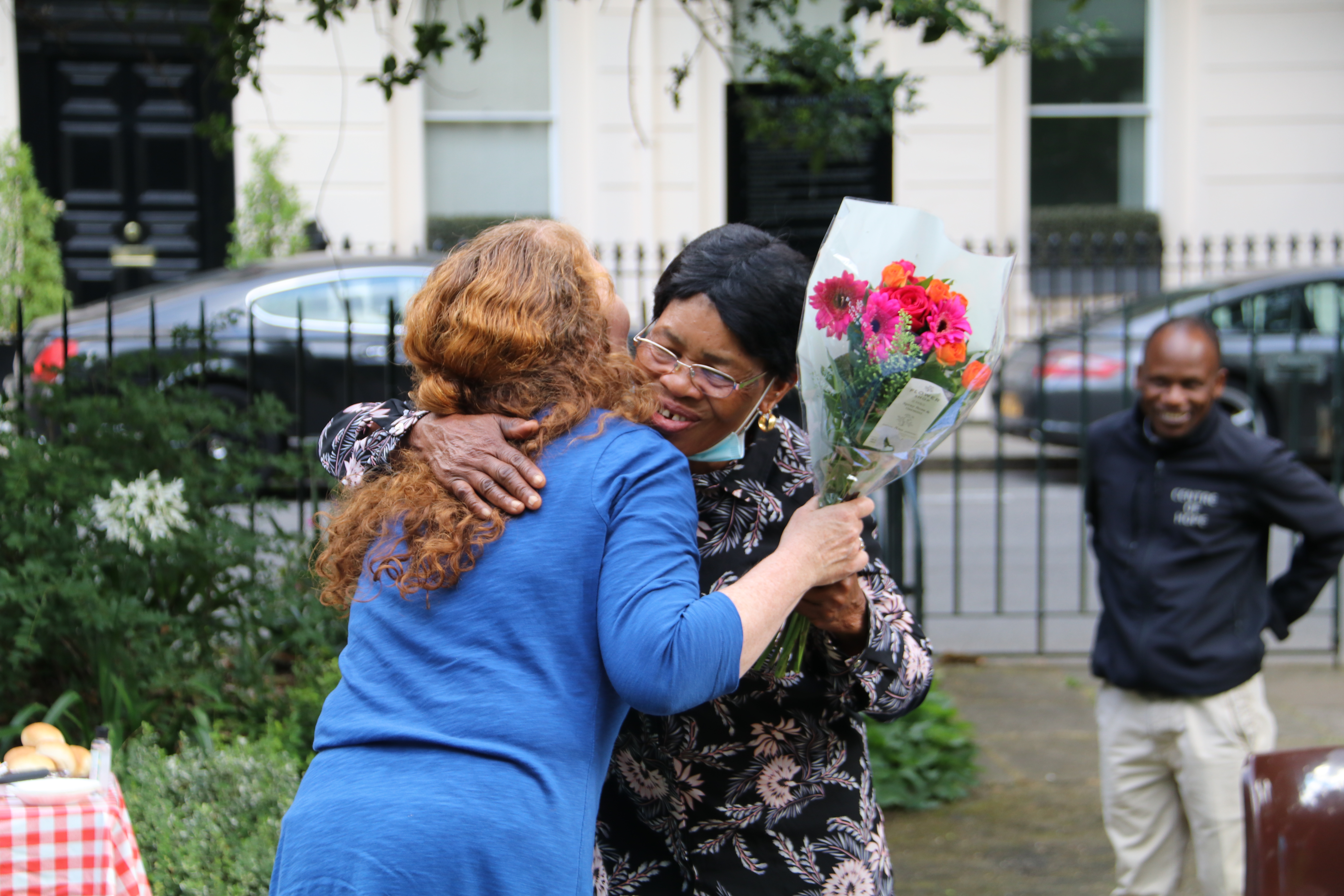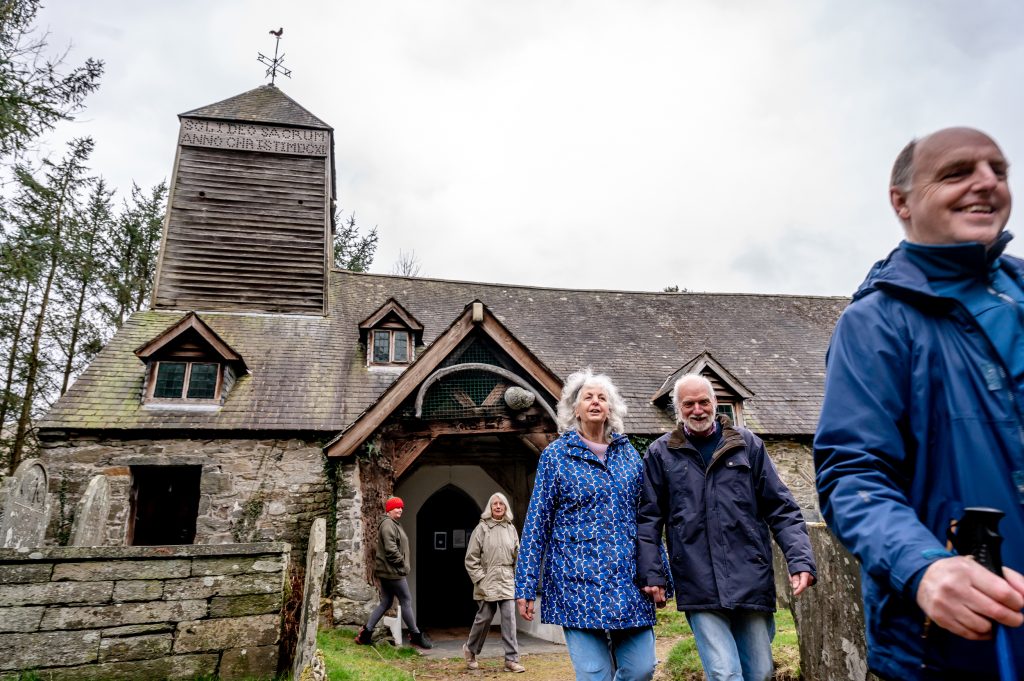WELCOMING ASYLUM SEEKERS IN WALES

Cytûn member organisation Housing Justice Cymru is leading partnership work in Wales to develop the Hosting provision for destitute asylum seekers, refugees and other people with insecure immigration status. Volunteer hosts welcome someone into their home for a set period of time to provide safety and stability. Having a place to stay and to store belongings and papers is a big step towards progressing a case. It also provides an opportunity to improve wellbeing and pursue education or volunteering.
Foreign nationals can become destitute in the UK for a range of reasons, finding themselves with no income and nowhere safe to sleep. Without Leave to Remain, there is no right to work or claim benefits, and people are left open to the risk of exploitation.
Many people who have lodged an asylum claim live in National Asylum Support Service (NASS) accommodation, managed in Wales by Ready Homes. The accommodation is variable in standard but provides a bed and a small weekly subsistence allowance. If an asylum claim is refused, however, a resident is given 21 days’ notice to leave the accommodation. There are very few options open to someone made destitute in this way, and Hosting can be a lifeline.
There are also vulnerable migrants outside the asylum system. People can lose their Leave to Remain following the breakdown of a relationship, for example, or the loss of a job. And in recent months some people have fallen through the European Union Settlement Scheme net, losing the rights they had when the UK withdrew from the European Union.
Paradoxically, for some people, the grant of Refugee status and Leave to Remain is an unsettled time in itself. Whilst breathing a sigh of relief, a new Refugee must navigate the transition from NASS to mainstream housing, benefits and employment. The Home Office allows a 28 day ‘grace period’ in which to do this.
There is a strong history of Hosting in Wales and over recent years thousands of safe nights’ sleep have been provided in the homes of volunteer hosts. Local organisations support both hosts and guests to make sure the placements are as robust as they can be. The Welsh Government has committed to becoming a Nation of Sanctuary and the Hosting work is part of that powerful movement of people, communities and organisations.
How can I get involved?
There is no ‘typical’ host. Hosting works in different ways for different people and arrangements are tailored to individual guests and hosts. The length of a stay can be anything from a few weeks to several months and house rules vary. If you are interested to hear more about hosting, please email Romy Wood on r.wood@housingjustice.org.uk
ENDING PHYSICAL PUNISHMENT IN WALES

Images of this kind are appearing on advertising and media outlets across Wales, as the Welsh Government prepares to implement the Children (Abolition of Defence of Reasonable Punishment) (Wales) Act 2020 on Monday 21 March. Information will also be delivered by post to households.
By law, parents and other adults who act as parents will no longer be able to physically punish children in Wales. The purpose of the legislation is to help protect children’s rights; it builds on the Welsh Government’s commitment to children’s rights under the United Nations Convention on the Rights of the Child.
Welsh Government’s website has resources for the public and partners, including a general leaflet, a leaflet for parents, frequently asked questions, supporting videos, a video explaining the law, a poster, timelines and a briefing note for stakeholders.
The Welsh Government’s campaign Parenting. Give it time supplements the legislation by promoting positive parenting techniques, with advice from parenting practitioners, professionals and experts on managing behaviour positively and without resorting to physical punishment. Parenting. Give it time can be followed on Facebook and at parenting.wales on Instagram.
On December 6, the first of a number of stories from the Discipline takes Discipline campaign was published highlighting the potential long-term impact of physical punishment on a child. ITV news coverage can be read and viewed here.
A LEGACY FROM CLIMATE SUNDAY

Cytûn and most of our member churches were partners in the Climate Sunday coalition of churches and Christian agencies, which encouraged churches to worship, commit and speak up ready for the COP26 conference in November. Although the coalition has now ended, the partners will continue to work on climate change. 340 people attended a webinar to hear about how local churches can take further steps to protect God’s Creation, and the webinar can still be viewed online, as can the wide range of worship resources in both Welsh and English. An updated section on the website guides churches how to continue to Speak Up on the issue, and the EcoChurch and Live Simply schemes will continue to be available for local churches to join.
MAKING DEVOLUTION WORK IN A UNITED KINGDOM
The four UK governments have taken important steps towards ensuring that there is a sound administrative regime to strike the balance between their ability to legislate and act in accordance with the wishes of the four nations and the need to coordinate law and markets across the UK.
When the modern devolved system of governance in Britain was established in 1999, a Joint Ministerial Committee (JMC) was established to oversee the interrelationship of the four administrations. Meetings were sporadic, but in the early years the fact that the same party (the Labour Party) formed three of the four administrations enabled a lot of informal co-ordination.
Even with different parties forming the four administrations after 2010, the fact that many of the devolved areas were subject to EU law meant that there was a framework within which all governments had to work. With the result of the 2016 referendum this had to change, and at the beginning of 2021 EU law ceased to apply in the United Kingdom – though many of the specific laws were kept (at least temporarily) through the European Union (Withdrawal) Act 2018.
The Covid 19 pandemic drew much more public attention to the need for co-ordination of the work of the four governments, as health is a devolved area. There have been a series of public disagreements between the governments on a number of issues, and there have been frequent complaints from the devolved administrations, including the Welsh Government, that there is no consistent system for discussing or resolving disputes. There was also dissatisfaction that the UK Government – because of its dual role as the government of England in devolved matters and the government of the UK as a whole – had to perform two functions within the meetings, and that there was no way to achieve impartial arbitration. Welsh Government published a number of reports on this – the most recent being Reforming our Union in July 2021.
This reflected the growing concern following the passing of the UK Internal Market Act by the Westminster Parliament – despite the refusal of consent by the Senedd – in December 2020. But at the last minute an amendment in the House of Lords included in the Act a statutory basis for the Common Frameworks which had been under discussion since 2018 by the four governments to try to cover the devolved administrations’ desire for greater freedom to legislate in these areas outside the European Union and the desire of the UK to co-ordinate policy areas across the four nations. Some of these frameworks have now been published and are being consulted on by the House of Commons Public Administration and Constitutional Affairs Committee until February 21. The content of the frameworks is quite technical, but following the pandemic and the resulting controversy, the outline framework on Protecting Public Health is of broader interest.
In January 2022, the UK Government published a Review of inter-governmental relations which establishes a new regime. This includes the Prime Minister’ and Heads of Devolved Governments Council; an Interministerial Standing Committee of the ministers responsible for intergovernmental affairs in each government; a Finance Interministerial Standing Committee; and Interministerial Groups on specific topics (such as Zero Net; Elections; Sports Cabinet; Tourism; Higher Education; Trade; the UK-EU Trade & Cooperation Agreement; and so on). Most significantly, there will be an Intergovernmental Secretariat that will be accountable to the four administrations (and not just to the UK Government) responsible for drawing up agendas etc. and arranging dispute resolution where necessary. Many of these arrangements reflect what was requested by the Welsh Government in Reforming our Union. This new regime is also reflected in the intention of the Office for the Internal Market (established by the UK Internal Market Act 2020) to treat all four administrations equally in dealing with any difficulties that arise with the UK internal market.
Although no set of administrative arrangements can prevent political disputes or misunderstanding arising from time to time, one may cautiously endorse the judgment of constitutional expert David Torrance in his paper for the House of Commons Library that this opens a new era for the interrelationship of the UK’s governments. Time will tell how things will develop.
Gethin Rhys
FINAL CURRICULUM DOCUMENTS PUBLISHED
A little later than expected, Welsh Government in January published the final documents to enable schools in Wales to prepare for the introduction of the new curriculum from September 2022. From that date, pupils up to year 6 will be educated using a locally prepared curriculum based on the national framework in these documents. Secondary schools will have the option of introducing the curriculum to Year 7 in September 2022 or September 2023, but will have to introduce it for Year 8 in 2023 and then to each other year in turn in subsequent years.
As well as tidying up the documents already published and updating the timetable and information on the legal position, the package of documents includes two sections that churches in Wales have discussed in detail and in depth with the Welsh Government over recent years, namely:
- Guidance on Religion, Values and Ethics. These are guidelines rather than a framework, for the reason explained in the document as follows:
Each local authority has a legal duty to convene an Agreed Syllabus Conference to review the syllabus and to recommend an appropriate syllabus to the local authority for it to adopt. The agreed syllabus for each local authority should be reviewed every five years.
Once an agreed syllabus has been adopted, all maintained schools and settings are required to have regard to the agreed syllabus including schools of a religious character, in their design of the agreed syllabus element of their RVE provision.Should a local authority wish to adopt or adapt this guidance as their agreed syllabus they may do so. - A number of Agreed Syllabus Conferences are planned over the coming weeks, and we wish representatives of the churches and other religious communities in each local authority well as they discuss how to apply the national guidelines to schools in their local area.
- Code and Statutory Guidance for Relationships and Sexuality Education: The Code was agreed by a vote in the Senedd in December 2021, and therefore this section of the curriculum has a specific statutory basis. We are pleased to see a particular recognition that this section of the curriculum (like all other sections) needs to respect children’s rights to freedom of expression and to be raised within a religious community. We are also pleased that the compulsory content in this section of the curriculum is based on underpinning experiences such as friendship and family relationships.
The whole curriculum requires schools to ensure that learners develop an authentic sense of cynefin, building knowledge of different cultures and histories, allowing them to develop a strong sense of individual identity and understanding how this is connected to and shaped by wider influences. Welsh Government explains cynefin further as follows: The place where we feel we belong, where the people and landscape around us are familiar, and the sights and sounds are reassuringly recognisable. Though often translated as ‘habitat’, cynefin is not just a place in a physical or geographical sense: it is the historic, cultural and social place which has shaped and continues to shape the community which inhabits it. Churches, chapels and faith communities are, of course, an integral part of this cynefin, and this opens up opportunities for local churches (like other local organisations) to deepen their links with their local schools.
When designing a local curriculum, the documents say This should be an ongoing conversation for the whole school and beyond, engaging with parents/carers and the wider community, including business, academia and public services. It should be informed by the school’s values and ethos, as well as by its location and surroundings. This reinforces the important opportunity afforded by the curriculum to engage with local schools, not only as the new curriculum starts, but on an ongoing basis, and the duty on schools to engage with churches as part of the local community.
Cytûn will continue to encourage local churches, and work with member denominations and organisations nationally, to make the most of these opportunities. Meanwhile, schools face quite some task to introduce a new curriculum while dealing with the effects of Covid-19, and it would be good for local churches to pray for their local schools and offer practical help wherever possible. Prayer material is available from Pray for Schools, and an online opportunity for prayer arranged on February 10.
FAITH IN THE FUTURE: CHURCH BUILDINGS IN WALES

The National Churches Trust and the Wales Places of Worship Forum (of which Cytûn and many of our member churches are part) is organising three Faith in the Future seminars
- building connections and engaging communities on 15th February at 1.30pm
- innovative ways to raise funds and income on 8th March at 1.30pm
- rising to the climate change challenge on 29th March at 1.30pm
Each webinar is free of charge. Register on EventBrite
Each seminar will provide an opportunity to hear from sector experts, with the latest research and advice. Perhaps more importantly we will also hear from volunteers at brilliant projects and examples of best practice at churches, chapels and other places of worship.
We are looking forward to hearing your response to discussions and the feedback that you provide will help inform the future work of the Welsh Places of Worship Forum. We’ll also encourage you to share ideas and questions with volunteers from churches, chapels and other places of worship taking part in the chat.
WINTER FUEL SUPPORT SCHEME FOR WALES

As part of a wider support package of over £50m to address immediate pressures on living costs, Welsh Government has made available over £38 million through a Winter Fuel Support Scheme.
The scheme is open to households where one member is in receipt of certain welfare benefits, which are:
- Income Support
- Income-Based Job Seekers Allowance
- Income-Related Employment & Support Allowance
- Universal Credit
- Working Tax Credits
Applicants must also be responsible for paying the energy bills for the property.
Anyone who requires financial assistance with off-grid fuel costs (such as oil, Liquefied Petroleum Gas (LPG) or coal) can consider applying to the Discretionary Assistance Fund.
Local councils will be contacting households to invite applications where they can identify potential eligibility for the winter fuel payment. However, anyone who believes they are eligible for the payment can submit a claim via their local council’s website from 13 December 2021. All applications must be received before 18 February 2022. Payments for successful applications will be made from January through to end of March 2022.
The Department for Work and Pensions and Her Majesty’s Revenue and Customs have confirmed that this payment will not affect an individual’s current benefits or be subject to tax.
CONTROVERSIAL LEGISLATION AT WESTMINSTER
A number of pieces of legislation currently before the Westminster Parliament are causing concern to our member churches, and to Christian churches and organisations across the UK.
The Nationality and Borders Bill makes fundamental reforms to the UK’s arrangements for admitting and assessing those seeking asylum (who, if successful, are awarded refugee status). In particular, asylum applications will be inadmissible if people arrive by unauthorised routes (such as landing in small boats on the coast). It will also limit protection to those who are victims of modern slavery to those who allege that this is the case within a specified time limit. The Chair of Cytûn has signed a multi-faith letter co-ordinated by the Joint Public Issues Team (Baptist Union of Great Britain, the Methodist and United Reformed Churches) which will be published early February; the Salvation Army is speaking out of its work on modern slavery; and the Society of Friends has submitted evidence to the Joint Committee on Human Rights at Westminster. The Bill is currently being examined in committee by the House of Lords, where some of the bishops of the Church of England have tabled amendments. Any changes made in the Lords will need to be considered by the House of Commons, which has already agreed to the Bill.
The Police, Crime, Sentencing and Courts Bill covers a wide range of issues of criminal justice. Part 4 of the Bill makes trespass with intent to reside a criminal offence, which will make life very difficult for Gypsies and Travellers, especially in those areas (including most local authorities in Wales) where there are not adequate official sites for Travellers to stay. Cytûn was involved, as part of the Wales Third Sector Equality and Human Rights Coalition, in corresponding with Lords and Members of the Senedd about this, and the Archbishop of Wales (Church in Wales) and several other member churches signed a multi-faith letter. The Senedd voted to withhold consent from this part of the Bill, but it is not yet known whether this will impede its application in Wales.
Clauses in the same Bill which will give police increased powers to prevent protests are being opposed by the Society of Friends and others in the Police Bill Alliance. Many amendments were made to this section by the House of Lords, and these changes will now need to be considered by the House of Commons.
The UK Government is consulting until March 8 on possible amendments to the Human Rights Act 1998, which would introduce a pre-hearing stage to reduce the number of human rights challenges reaching the courts; limit the degree to which domestic courts can take precedents from the European Court of Human Rights into account; prescribe in more detail the ways in which some human rights should be interpreted in the UK; and add some additional rights, such as a right to trial by jury. Welsh Government has expressed concern about the proposed changes and invited faith groups and others to meet to consider the implications of these changes, and the Senedd’s Equality and Social Justice Committee has launched an inquiry and invited Cytûn to participate. We would welcome contributions to our response from our member churches and organisations.
CONTACTING CYTÛN’S POLICY OFFICER
Parch./Revd Gethin Rhys – Swyddog Polisi/Policy Officer
Cytûn – Eglwysi ynghyd yng Nghymru/Churches together in Wales
Registered office: Room 3.3, Hastings House, Fitzalan Court, Cardiff CF24 0BL
Working at home. Mobile: 07889 858062
E-mail: gethin@cytun.cymru www.cytun.co.uk @CytunNew
Hapus i gyfathrebu yn Gymraeg ac yn Saesneg.
Happy to communicate in Welsh and English
Cytûn is a registered company in England and Wales | Number: 05853982 | Registered name: “Cytûn: Eglwysi Ynghyd yng Nghymru/Churches Together in Wales Limited” | Cytûn is a registered charity | Number: 1117071
Publication date: 27 January 2022. The next Bulletin will be published on 28 March 2022.
